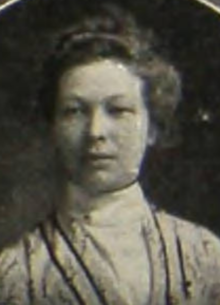Nellie Olea N. Barsness (July 9, 1873 – May 12, 1966) was an American physician and temperance worker, based in Minnesota. She was decorated by the French government for her work with gas-injured soldiers in France during and after World War I.
Nellie Barsness | |
|---|---|
 Nellie Barsness, from the 1902 yearbook of the University of Minnesota | |
| Born | July 9, 1873 Pope County, Minnesota, U.S. |
| Died | May 12, 1966 (aged 92) St. Paul, Minnesota, U.S. |
| Occupation | Physician |
Early life and education
editBarsness was born on a farm in Barsness Township, Pope County, Minnesota, the daughter of Nels Nielson Barsness and Bertha (Betsy) O. Thoreson Barsness. Her parents were among the first Norwegian immigrant homesteaders in Minnesota[1]; her father was also a Union Army veteran of the American Civil War.[2][3] She trained as a teacher in St. Cloud. After teaching a few years, she trained as a physician at University of Minnesota Medical School, completing her medical degree in 1902.[4][5]
Career
editBarsness was an ophthalmologist and otolaryngologist. She also attended the first conference on radiology, held in 1904 in Niagara Falls.[6] During World War I, she went to France with the Women's Overseas Service League.[7] She was stationed at Cempuis to treat soldiers wounded by gas attacks, and conducted clinics to relieve French doctors in Nancy and Theims. She was decorated by the French government with a Medaille d'Honneur, in recognition of her wartime service.[5][6]
In Minnesota after the war, she was on the staff of the state women's reformatory at Shakopee, and active in the Women's Christian Temperance Union (WCTU),[8] as the Minnesota chapter's health director. In 1940 she was elected president of the Minnesota Medical Women's Association.[9] She was also active in the American Medical Women's Association, the Business and Professional Women's Association of St. Paul, and the YWCA.[10][11] She marked her fiftieth anniversary in the medical profession in 1953,[3] and was named "Doctor of the Year" by the Minnesota Medical Association in 1956.[6] In 1958, she was guest editor of the Journal of the American Women's Medical Association,[12] and contributed an essay to that issue, "Highlights in Careers of Women Physicians in Pioneer Minnesota."[13]
Barsness and her sister Jennie were survivors of the 1903 Iroquois Theatre fire.[14] Barsness held a patent for a sanitary toilet seat cover, issued in 1921.[6][15][16]
Personal life
editAfter her war work, Barsness lived with her sister Thilda, a widow with a young son.[6] When Thilda died in 1938,[17] Barsness adopted her teenaged nephew Harry N. Simmonds, who also became an otolaryngologist.[18] She died in 1966, aged 92 years, in St. Paul.[4] Her old roll-top desk is in the collection of the Pope County Historical Society.[19] The University of Minnesota Medical School has a Dr. Nellie N. Barsness Scholarship, endowed by Simmonds and given to outstanding female students.[20]
References
edit- ^ *Gavin, Lettie (1997). American Women in World War I: They Also Served. University Press of Colorado. pp. 166–167. ISBN 0-87081-432-X.
- ^ The Barsness Family: Descendants of Nels and Agathe Barsness (1799–1979). Swedenburg. 1979.
- ^ a b Bernard, Marcelle T. (April 1953). "Nellie O. Barsness, M.D." Journal of the American Medical Women's Association. 8 (4): 151. PMID 13034579 – via Internet Archive.
- ^ a b Shearer, Benjamin F. (2007). Home Front Heroes: A Biographical Dictionary of Americans During Wartime. Greenwood Publishing Group. p. 53. ISBN 978-0-313-33421-4.
- ^ a b Gavin, Lettie (May 18, 2011). American Women In World War I. University Press of Colorado. ISBN 978-1-4571-0940-9.
- ^ a b c d e Allert, Johannes R. (Summer 2018). "'Dr. Nellie': One Physician's Experience at the Front in the Great War" (PDF). Ramsey County History. 53 (2): 12–20.
- ^ Lemay, Kate Clarke (August 16, 2020). "Opinion: The untold story of women who risked their lives to do good -- and get their rights". CNN. Retrieved July 10, 2022.
- ^ "W.C.T.U. Will Elect Officers Tomorrow". The Minneapolis Star. August 3, 1921. p. 3. Retrieved July 10, 2022 – via Newspapers.com.
- ^ "State Medical Women Elect". The Minneapolis Star. May 12, 1940. p. 46. Retrieved July 10, 2022 – via Newspapers.com.
- ^ Lemay, Kate Clarke; Goodier, Susan; Jones, Martha; Tetrault, Lisa (March 26, 2019). Votes for Women: A Portrait of Persistence. Princeton University Press. p. 86. ISBN 978-0-691-19117-1.
- ^ "Y.W.C.A." Ariel. 23: 227. February 3, 1900.
- ^ "Nellie N. Barsness M.D., Guest Editor". Journal of the American Medical Women's Association. 13 (1): 8. January 1958 – via Internet Archive.
- ^ Barsness, Nellie N. (January 1958). "Highlights in Careers of Women Physicians in Pioneer Minnesota". Journal of the American Medical Women's Association. 13 (1): 19–22. PMID 13513427 – via Internet Archive.
- ^ "Two More Who Escaped". The Minneapolis Journal. January 6, 1904. p. 7. Retrieved July 10, 2022 – via Newspapers.com.
- ^ US 1396547, Barsness, Nellie N., "Sanitary appliance for closet-seats", published 1921-11-08
- ^ United States Patent Office (November 8, 1921). Official Gazette of the United States Patent Office. The Office. p. 328.
- ^ Richmound Historical Society (1978). Richmound's heritage : a history of Richmound and district, 1910–1978. Internet Archive. Richmound, Sask. : Richmound Historical Society. p. 178. ISBN 978-0-88925-027-7 – via Internet Archive.
- ^ "Former Chester Doctor Joins Unit in Korea". Great Falls Tribune. June 3, 1952. p. 5. Retrieved July 10, 2022 – via Newspapers.com.
- ^ "Physical Object : Desk, Rolltop". MN Collections - Minnesota's Local History Database. Retrieved July 10, 2022.
- ^ "Duluth Scholarships & Awards". Medical School - University of Minnesota. February 23, 2018. Retrieved July 10, 2022.